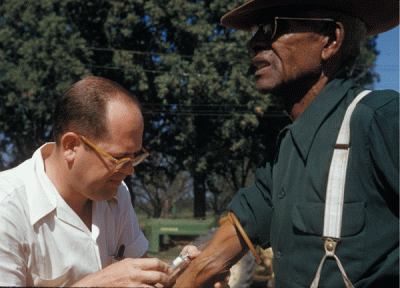Unethical Medical Experiments on Blacks: Tuskegee & Beyond

Tuskegee syphilis study: doctor injects subject with placebo unknown to subject (Image: Wiki Commons)
Blood: The Dark Legacy of Medical Betrayal
In the early 20th century, a promise whispered in Macon County, Alabama—”special treatment” for “bad blood”—turned out to be the beginning of a cruel deception. The Tuskegee Syphilis Study, orchestrated by the U.S. Public Health Service from 1932 to 1972, targeted 600 Black men—399 with syphilis and 201 without—who were misled and never informed of their condition or offered penicillin, even when it became the standard cure in 1947. Their trust was weaponized against them. Many suffered ghastly complications. Some died; others transmitted the disease to wives and children. The study finally ended when exposed by Associated Press in 1972, leading to public outrage, a $10 million settlement, and a formal apology by President Bill Clinton in 1997.
Beyond Tuskegee: More Stories of Exploitation
1. Guatemala Syphilis Experiments (1946–1948)
In a disturbing echo of Tuskegee, U.S. doctors deliberately infected around 1,300 Guatemalan prisoners, mental patients, orphans, sex workers, and soldiers with syphilis, gonorrhea, and chancroid—without consent. Only about half received treatment, and 83 died amid these experiments. It wasn’t until decades later that the truth emerged, prompting formal apologies from U.S. officials in 2010.
2. Holmesburg Prison Tests (1950s–1970s)
In Philadelphia’s Holmesburg Prison, predominantly Black inmates were subjected to toxic creams, radiation, and dioxin—without genuine consent—by University of Pennsylvania researchers. These painful trials linger in public memory. Formal apologies have been issued, yet calls for reparations persist.
3. J. Marion Sims and Surgical Exploitation (1845–1849)
Often glorified as the “father of modern gynecology,” J. Marion Sims performed repeated vaginal surgeries on enslaved Black women—Anarcha among them—without anesthesia or consent. Their suffering contributed to medical advances, but their humanity was sacrificed in the process.
4. Eugenic Sterilizations & “Mississippi Appendectomy” (20th Century)
State-sanctioned eugenic programs targeted Black, Indigenous, and Latina women, coercively sterilizing them under racist pseudoscience. This abuse included non-consensual hysterectomies—even prominent activists like Fannie Lou Hamer were victims. The term “Mississippi appendectomy” became a chilling euphemism.
5. Mustard Gas on Black Soldiers (1940s)
Black, Japanese-American, and Puerto Rican soldiers were involuntarily enrolled in secret U.S. military tests exposing them to mustard gas and chemical agents—ostensibly to test racial differences in skin sensitivity. The consequences were painful and long-lasting.
6. Navrongo, Ghana & Trovan in Nigeria (1990s)
In the Navrongo region of Ghana, family planning trials administered Depo-Provera to nearly 9,000 impoverished women without informed consent. Similarly, during a meningitis outbreak in Nigeria, Pfizer tested an unapproved antibiotic, Trovan, on children—resulting in deaths and serious disabilities, amid accusations of consent violations.
These stories, ranging from sterilization to chemical testing, underscore a global pattern: marginalized bodies used as data points, not human beings. These betrayals aren’t just relics of the past—they reverberate in modern-day medical mistrust. The legacy of Tuskegee, Guatemala, and Henrietta Lacks fuels skepticism toward healthcare, especially among Black communities. Clinicians and public health campaigns—like COVID-19 vaccination efforts—must confront this history and earn trust through transparency, accountability, and representation.
Every one of these unethical chapters led to important reforms—and painful lessons. The exposure of Tuskegee helped establish ethical safeguards like Institutional Review Boards (IRBs) and laws enforcing informed consent. The Guatemala scandal spurred fresh dialogue on accountability. Yet, vigilance remains vital; ethical norms can slide if not actively upheld. We must remember these stories—not to altar shame or dwelling in past wrongs—but to honor victims, educate ourselves, and ensure never again. In the voices of survivors, descendants, and academics lies a powerful plea: let justice align with medicine, and let science always serve humanity—not the reverse.
References at a Glance
Guatemala experiments: 1946–1948 infection of vulnerable groups; apology in 2010.
Holmesburg Prison: decades of inmate testing; formal apologies, ongoing reparations efforts.
J. Marion Sims: surgical experiments on enslaved women without anesthesia.
Eugenics sterilization: coercive sterilizations of minority women in 20th-century U.S.
Mustard gas tests: racial military experimentation during WWII.
Navrongo & Nigeria: contraceptive and antibiotic trials without consent.
Modern mistrust: ongoing vaccine hesitancy traced to these abuses; need for ethical transparency.
Recommended:
White-Washed: The Missing Black Populations of North Africa
Vanishing Echoes: Black Populations Are Disappearing
African DNA: Humanity’s Deepest Roots & Cradle of Diversity
